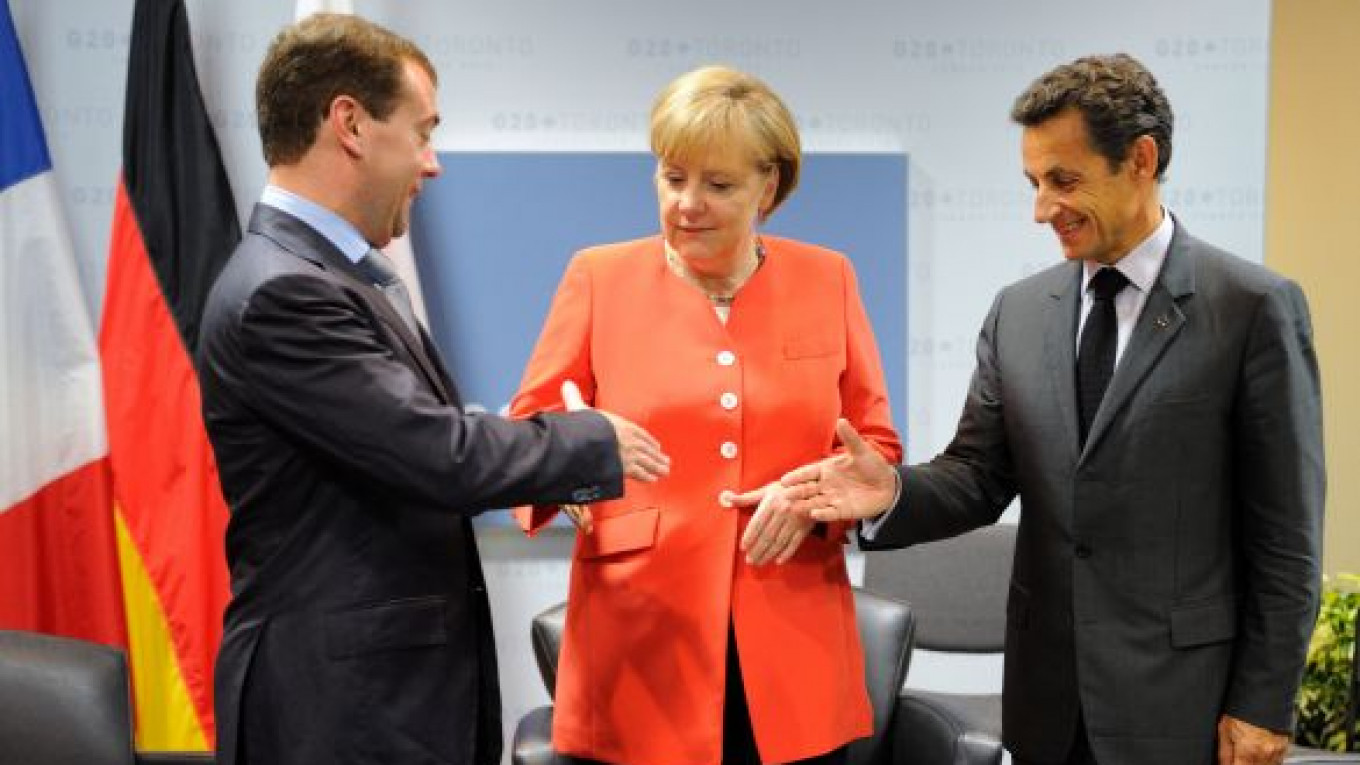Group of 20 leaders responded to the European debt crisis with deficit-reduction targets and agreed to pursue higher capital requirements for banks once economic recoveries take hold.
Advanced G20 economies will aim to halve deficits by 2013 and start to stabilize their debt-to-output ratios by 2016, the group said in a statement Sunday after a meeting in Toronto. Leaders said nations can move at their own pace and also pledged to fulfill existing stimulus plans.
While U.S. President Barack Obama is pushing his counterparts to focus on spurring growth, leaders in Britain and Germany are already tightening spending to bolster investor confidence. U.S. and European stocks both had their biggest weekly drops in more than a month last week as investors renewed concerns that countries may be unable to repay debts.
“The view of the business community is that we need fiscal restraint in order to ensure confidence and, therefore, sustainable economic growth,” said Gordon Nixon, chief executive officer of Royal Bank of Canada, the country’s biggest bank. “These targets are very important.”
Canadian Prime Minister Stephen Harper said his country could meet the targets, which as chairman of the meeting he had proposed earlier this month, as soon as next year. The agreement still amounted to a compromise that lacks strength, said Stephen Roach, Morgan Stanley’s Asia chairman. ?
“I am underwhelmed,” Roach said. “By attempting to finesse the trade-off between America’s call for ongoing stimulus and Europe’s penchant for fiscal consolidation the G20 has come up with a multipurpose recipe with no enforcement mechanism.”
“With respect to deficits, markets are giving Europe direction, and markets are more powerful than words from President Obama,” said Tony Fratto, who served as a White House and U.S. Treasury official under former President George W. Bush. ?
Neither the G8 nor the G20 mentioned China’s currency, though the G20 did call for “greater exchange rate flexibility in some emerging markets.” China indicated on June 19 that it was scrapping the yuan’s two-year-old peg to the dollar and reiterated the aim at a media briefing on June 26. ?
The communique left out the G20's welcome of China's move toward currency flexibility at China's request, Finance Ministry department head Andrei Bokarev said.
G20 leaders also pledged to push for agreement on greater voting power for emerging economic powers in the International Monetary Fund by the next summit in Seoul, South Korea, in early November.
Such a shift would boost the say of countries such as China, India, Brazil and Russia in the IMF, which has long been dominated by the United States and European countries.
Leaders reiterated their commitment to a shift in power to dynamic emerging economies of at least 5 percent, which was agreed upon at a G20 leaders' meeting in Pittsburgh last year.
They called for an agreement by the next G20 summit on Nov. 11-12. The agreement will have to be ratified by the IMF's 187 member countries by January 2011.
Emerging economies hold less than 45 percent of voting shares in the IMF. They want an even bigger voting shift than 5 percent to reflect their growing economic influence.
But the IMF negotiations pose political challenges because European countries must accept the biggest cuts in their votes in the IMF, an institution that influences global economic policies.
"We called for an acceleration of the substantial work still needed for the IMF to complete the quota reform by the Seoul Summit and in parallel deliver on other governance reforms, in line with commitments made in Pittsburgh," said the communique, published after the G20 meeting.
"Modernizing the IMF's governance is a core element of our effort to improve the IMF's credibility, legitimacy and effectiveness," it added.
Some members believe that subscriptions that determine a member's voting power in the IMF need to be doubled also to boost the fund's resources.
President Dmitry Medvedev said IMF reforms and broader governance changes, including the selection of the head of the IMF and composition of the IMF board, need to be "taken to the finish."
The communique didn't mention one of Russia's pet issues — increasing the number of global reserve currencies.
Presidential aide Arkady Dvorkovich said before the meeting that Medvedev and his G20 counterparts may agree to include more IMF Special Drawing Rights as part of reserves.
Outside the security fence that surrounded the meeting, protests turned violent for both days of the summit. Protesters set fire to cars, smashed store windows and threw rocks at First Canadian Place, headquarters of the Bank of Montreal. Police have detained more than 500 people since June 18, said Tim Garland, a spokesman with the Integrated Security Unit, a coalition of police forces providing security for the summit.
(Reuters, Bloomberg)
A Message from The Moscow Times:
Dear readers,
We are facing unprecedented challenges. Russia's Prosecutor General's Office has designated The Moscow Times as an "undesirable" organization, criminalizing our work and putting our staff at risk of prosecution. This follows our earlier unjust labeling as a "foreign agent."
These actions are direct attempts to silence independent journalism in Russia. The authorities claim our work "discredits the decisions of the Russian leadership." We see things differently: we strive to provide accurate, unbiased reporting on Russia.
We, the journalists of The Moscow Times, refuse to be silenced. But to continue our work, we need your help.
Your support, no matter how small, makes a world of difference. If you can, please support us monthly starting from just $2. It's quick to set up, and every contribution makes a significant impact.
By supporting The Moscow Times, you're defending open, independent journalism in the face of repression. Thank you for standing with us.
Remind me later.


